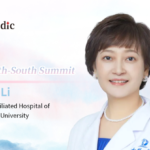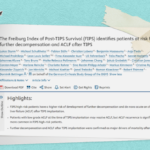
On the occasion of the 2025 POST-ASCO GI and the 2nd Oncology Basic and Translational Research Forum, Oncology Frontier conducted an in-depth interview with the event’s Executive Chair, Dr. Yanhong Deng, from The Sixth Affiliated Hospital of Sun Yat-sen University. A leading figure in colorectal cancer research in China, Professor Deng’s team had two groundbreaking studies featured at ASCO GI, shedding light on targeted interventions for BRAF mutations and the emerging therapeutic potential of FGFR. These findings provide critical evidence-based guidance for clinical practice.In this exclusive interview, Professor Deng reflects on the evolution of the POST-ASCO GI meeting, now in its 11th year, as a bridge between global advancements and domestic practice. She also shares her insights on how medical resea1rch in China is transitioning from a phase of following international trends to leading innovation. Drawing on her deep expertise in both clinical and research domains, Professor Deng provides valuable perspectives on how clinicians can balance scientific innovation with patient care in an era of rapid transformation.
Oncology Frontier: As the official post-ASCO GI meeting, could you first introduce the research from your team that was selected for ASCO GI this year? As the Executive Chair of this conference, how do you see its significance in advancing the integration of fundamental cancer research and clinical translation?
Dr. Yanhong Deng: When I first started my career as a medical oncologist, I had two dreams: delivering an oral presentation at the ASCO Annual Meeting and publishing in Journal of Clinical Oncology (JCO). Today, I am fortunate to have achieved both ahead of schedule. In fact, our initial breakthrough was when our study was selected for a poster presentation at ASCO GI, which was our first step toward securing an oral presentation at ASCO. At the time, simply having a poster was a proud moment. Now, not only at ASCO GI but also at ASCO, we see a growing presence of Chinese researchers presenting their work.
This year, we submitted two retrospective studies to ASCO GI, and both were selected as poster presentations. Both studies focus on the molecular subtypes of colorectal cancer. The first study examined patients with BRAF mutations in a real-world, single-center cohort. We identified three key findings. Regardless of disease stage, patients receiving triplet therapy or intensive chemotherapy had better outcomes than those who did not. Patients who became eligible for surgery following treatment and underwent resection had superior outcomes compared to those who did not undergo surgery. The use of BRAF inhibitors significantly improved patient outcomes. Although this was a retrospective study, these findings have important clinical implications, providing valuable insights for treatment decisions.
Our second study incorporated a larger patient cohort and conducted extensive genomic analyses. We focused on FGFR, a target widely studied in other malignancies but often overlooked in colorectal cancer. FGFR plays a critical role in colorectal cancer development and progression. In bile duct and gastric cancers, FGFR-targeted therapies have already been developed, but the significance of this pathway in colorectal cancer remains underexplored. Our analysis of genomic sequencing data revealed that FGFR amplification has significant clinical relevance in colorectal cancer. Given that targeted therapies against FGFR already exist and that this alteration can be detected via protein-based assays, we believe this finding holds translational potential despite being a retrospective study. Moving forward, we plan to further investigate the role of FGFR in colorectal cancer.
As for the importance of POST-ASCO GI, this global post-conference event has now been held for 11 consecutive years. Our mission has remained unchanged: to disseminate the latest advancements in GI oncology. For myself and for experts nationwide, three key meetings—ASCO GI, ESMO, and ASCO—are of paramount importance. Among these, ASCO GI, held annually in January as the first major GI-focused oncology conference of the year, is particularly significant. I have always appreciated ASCO GI for its focused themes, manageable scale, and ability to set new research directions.
It was with this vision that we established POST-ASCO GI—to bring the latest global insights to China and integrate them with local clinical experience. As Chinese research capabilities continue to advance, this conference has also evolved into a platform showcasing the achievements of domestic research teams.
Oncology Frontier: In recent years, the integration of fundamental cancer research and clinical translation has become increasingly close. This conference has also introduced a dedicated “Oncology Basic and Translational Research Forum.” How do you view this trend, and what research directions do you think could serve as future breakthroughs in gastrointestinal oncology?
Dr. Yanhong Deng: The progress of medicine is inseparable from scientific exploration. It is both a humanities discipline and a natural science discipline, serving as the intersection of the two. Since last year, we have been organizing the Translational Research Forum, and this year marks its second edition. This has become a key highlight of the conference. The reason for establishing such a forum is to meet the evolving needs of medical development in China.
Over the past two to three decades, our clinical diagnosis and treatment capabilities have reached an internationally advanced level. While we may still lag behind Western countries in new drug development, our routine clinical management of patients is fully aligned with global standards. In this new era, we can no longer afford to wait for breakthroughs from others before catching up—we must take the initiative. With the world’s largest patient population, we have a unique opportunity to collaborate more closely with fundamental scientists to tackle critical clinical challenges. At the same time, clinicians need to stay informed about the most advanced technologies in life sciences to help address patient needs.
To facilitate this, we established the Translational Research Forum under the Southern Oncology Clinical Research Association and the Guangdong Research-Oriented Hospital Society to promote research translation. Of course, this is a challenging task, and at this stage, we are only in the process of building the platform. Whether we can achieve substantial breakthroughs remains to be seen, but this effort aligns with the national strategy for medical development, particularly in oncology.
On an individual level, I believe not everyone is suited to engage in both clinical and basic research simultaneously. Young doctors should first ask themselves what their true passion and career goals are. Engaging in basic research should not be a forced endeavor—it should be driven by genuine interest. The evaluation of physicians is also undergoing a transformation. The traditional view that only doctors who engage in research are considered excellent is gradually shifting. We are returning to the core principle that being a good doctor primarily means providing excellent patient care. If one has the capacity, they can engage in clinical research; if they are even more capable, they can conduct fundamental research alongside clinical work.
Currently, I am involved in some fundamental research projects, particularly in analyzing the immune microenvironment. In the AI era, we now have faster and more efficient ways to uncover the key molecular events occurring in the immune microenvironment before and after treatment, as well as the precise mechanisms of drug resistance. I am confident that this field will witness significant breakthroughs. Additionally, our team is investigating the novel applications of existing drugs, such as anti-inflammatory agents, to identify optimal use cases in new clinical settings. In this area, we are also making notable progress.
Oncology Frontier: In recent years, significant advancements have been made in colorectal cancer immunotherapy and precision classification. What do you believe will be the most noteworthy breakthroughs in this field over the next three to five years?
Dr. Yanhong Deng: This question is closely related to our previous discussion. Immunotherapy and precision classification represent the two major directions in cancer treatment. In the past, oncologic therapies primarily focused on directly eliminating tumors, whether through chemotherapy, surgery, radiotherapy, or targeted therapies. However, the emergence of immunotherapy has made us realize that, beyond directly attacking the tumor, we can also leverage the body’s immune system to participate in anti-tumor treatment. This undoubtedly represents the future of oncology.
With the continuous advancement of AI technology, the application of immunotherapy will become even more precise. In the future, AI will help us determine the most effective treatment contexts for immunotherapy and identify the patient populations most likely to benefit. This will propel us into the era of precision medicine. Currently, many patients receive the same chemotherapy, immunotherapy, or targeted therapy regimens, but with AI-driven analysis, we will be able to distinguish which patients are best suited for specific treatments.
As a result, even patients with similar clinical characteristics may receive entirely different treatment plans in the future. This precision will not only apply to chemotherapy regimens but will also extend to immunotherapy, targeted therapy, and even the optimal timing of surgical and radiotherapy interventions. I anticipate that in the near future, we may finally achieve the level of truly individualized treatment that we have long envisioned.
Expert Profile: Yanhong Deng
- Professor, Chief Physician, Doctoral Supervisor, Postdoctoral Mentor
- Vice President, Sixth Affiliated Hospital of Sun Yat-sen University
- Director, Department of Oncology, Sun Yat-sen University School of Medicine
- Member, National Health Commission Expert Panel on Colorectal Cancer Treatment Guidelines
- Vice Chair, Integrative Oncology Committee, Chinese Anti-Cancer Association
- Standing Member, Precision Oncology Committee, Chinese Anti-Cancer Association
- Standing Member, Cancer Supportive and Nutritional Therapy Committee, Chinese Anti-Cancer Association
- Standing Member, CSCO Colorectal Cancer Expert Committee
- Vice Chair, Oncology Section, Guangdong Medical Association
- Secretary-General, Guangdong Research-Oriented Hospital Society
- Chair, Medical Oncology Committee, Guangdong Research-Oriented Hospital Society
- Published over 70 high-impact research articles as first or corresponding author in J Clin Oncol (3 papers), Cancer Cell, Lancet Gastroenterol & Hepatol, Lancet Oncology, Clin Cancer Res, and other leading journals.


